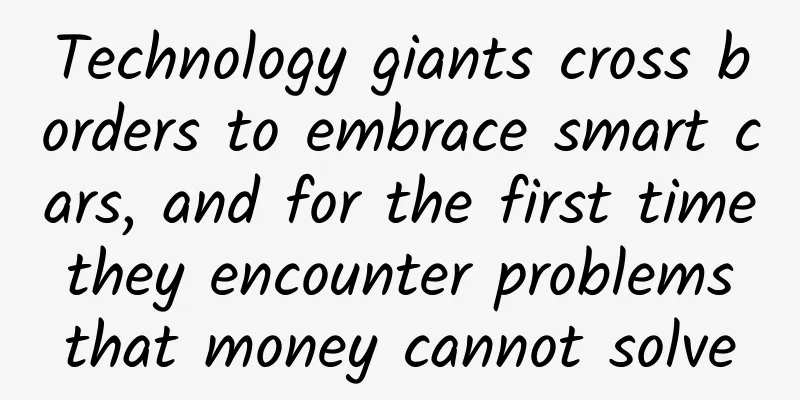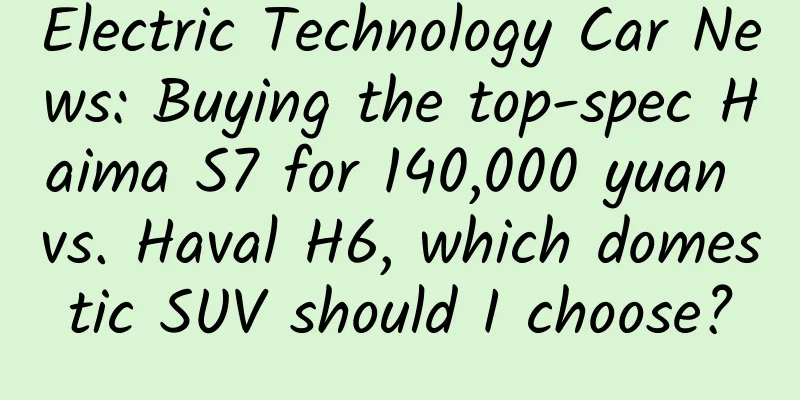Technology giants cross borders to embrace smart cars, and for the first time they encounter problems that money cannot solve

|
Among China's technology giants, Huawei was the last to enter the field of smart cars. Just recently, Huawei signed a cooperation agreement with Changan Automobile. As early as 2014, Alibaba had begun to work with SAIC to build an Internet car based on YunOS. Last November, Tencent launched the "AI in car ecosystem" and started cooperation with GAC, Changan, Geely, BYD and other companies. Compared with Alibaba's emphasis on in-vehicle systems, Tencent pays more attention to the development of in-vehicle intelligent applications. At the Baidu AI Developer Conference held a few days ago, Baidu not only announced its latest progress in autonomous driving, but also launched the Xiaodu in-car OS. BAT, together with Huawei, it seems to be a trend for technology giants to join hands with traditional car companies to jointly develop smart cars. But making cars is not like writing code. If you make a mistake, you can just fix the bug or start over. But in the automotive industry, this is an unforgivable mistake, and challenges arise from this. The pain of chemical reaction between car companies and Internet companies Internet companies and traditional car companies have great advantages in their respective fields, but in the field of smart cars, there is obvious room for complementary cooperation between the two sides. Huawei and BAT have different main businesses, different resource advantages, and different angles of entry into the smart car field, but they have one thing in common: they have no experience in making cars. Making cars has never been an easy task. While many new car-making forces have threatened to subvert the traditional automobile industry, only a few have survived. In the traditional automobile industry, it usually takes about five years for a car to be designed, developed and delivered to users. From design to testing, a large amount of funds are required as support. The automobile industry has a long production cycle, requires a very high capital scale, and needs to rely on long-term technical accumulation and close cooperation of the entire industry. At present, none of BAT and Huawei have announced that they will build cars. Because building cars is far from enough, even if they burn tens of billions. Even for a rich man like Jack Ma, tens of billions is an investment that cannot afford the result of failure. In fact, the profound accumulation of traditional car companies in quality system, vehicle control, chassis control, sales network, etc. cannot be obtained by spending money. It takes time. Even powerful companies like Google and Apple announced after trying that they would give up on making their own cars and instead focus on developing systems and software, putting their energy on smart cars and driverless driving rather than producing entire vehicles. However, it is not easy for traditional car companies to make smart cars. BYD is a typical example of a vertically integrated strategy, striving to build a closed automotive industry chain and even trying to develop and produce parts on its own. But in the face of smart cars, BYD chose to work with Baidu to jointly build an autonomous driving vehicle certification platform. At the same time, BYD's 341 sensor data and 66 control rights on the car body will be fully connected with Baidu Apollo. As early as 2010, SAIC began to explore vehicle networking technology solutions and independently developed the inkaNet system, which was installed on the Roewe 350 for experimentation, but the results were not ideal. SAIC then realized that relying solely on self-development had no future and that it must rely on external forces, which led to its long-term cooperation with Alibaba. In fact, if traditional automobile manufacturers rely solely on their own product development, it will be difficult for them to break away from path dependence, and innovation will be particularly difficult. When traditional car companies cooperate with Internet companies that focus on user operations, innovation and efficiency, the acceleration of the intelligent process will achieve the effect of 1+1>2. Money can't do anything But cooperation between Internet companies and traditional car companies is not that easy. Alibaba and SAIC are a model of industry cooperation. The cooperation was directly decided by Jack Ma and SAIC Chairman Chen Hong, which minimized the friction and resistance of the cooperation. But even so, the two sides still face huge contradictions that need to be reconciled during the cooperation process. Internet companies and car companies have different corporate cultures. Internet companies pursue efficiency, rapid iteration and user experience, while car companies emphasize safety, standardized processes and perfect systems. The two very different cultures will lead to a series of conflicts and directly affect the progress of research and development. It is easy to imagine how difficult it is for two companies with different genes to cooperate. Alibaba and SAIC are both giants, and the cooperation of equal strength has led to the emergence of many factions. In fact, from the beginning, in addition to the Zebra Network jointly invested by both parties, Alibaba and SAIC also established a new company each, and each side went its own way. Some media have revealed that the conflict between the two sides ran through the entire development process, and when the argument was the most intense, some people even threw their computers and ran out. In March this year, Hao Fei, former senior vice president of Banma Network, replaced Shi Xuesong as the new CEO of Banma Network. Alibaba's partners have expanded from SAIC Passenger Vehicle to joint venture brands such as Dongfeng Citroen, Dongfeng Peugeot, and Ford. Banma Network's intention to de-SAIC is obvious. In Baidu Encyclopedia, Banma Network says it is "a smart company that provides Internet car overall solutions for the entire automotive industry." The importance of data to the development of smart cars is self-evident. Traditional car companies regard data as the golden eggs laid by their own hens, while Internet companies naturally require data sharing. Baidu's Apollo project now has many partners, which makes it easier for Baidu to integrate resources. But the more partners there are, the more data barriers there are. Baidu hopes to build an open platform for data sharing, but car companies see data as their lifeline. Unless the country forces car companies to share data, it is hard to imagine how much interest is needed to achieve data sharing between different car companies. Even in the Zebra network, Alibaba and SAIC’s data are not completely shared. Zebra designed a set of algorithms to act as a black box for the data reactions of both parties, and the final results are directly applied. In this process, the databases of both parties remain independent of each other. With the development of smart cars, cars are becoming smart terminals similar to computers and mobile phones. Traditional mechanical cars are gradually becoming an information-based Internet of Things platform. The improvement of the level of automobile intelligence depends on software, and the core of software is the operating system. Based on the operating system, the vehicle can collect and summarize data and output AI capabilities based on the data, which is the commanding height of the research and development of intelligent connected vehicle technology. International giants such as Microsoft and Google have already taken the lead in developing intelligent connected car operating systems. my country's automotive operating system development started late and there is a big gap with foreign advanced companies. A good ecosystem is the key to promoting the development of operating systems. It is very difficult for a single manufacturer to maintain the entire ecosystem. Even Apple and Google have been operating for many years to have the current ecosystem. From this point of view, the road for Internet companies and traditional car companies to work together while seeking common ground while reserving differences has just begun. As a winner of Toutiao's Qingyun Plan and Baijiahao's Bai+ Plan, the 2019 Baidu Digital Author of the Year, the Baijiahao's Most Popular Author in the Technology Field, the 2019 Sogou Technology and Culture Author, and the 2021 Baijiahao Quarterly Influential Creator, he has won many awards, including the 2013 Sohu Best Industry Media Person, the 2015 China New Media Entrepreneurship Competition Beijing Third Place, the 2015 Guangmang Experience Award, the 2015 China New Media Entrepreneurship Competition Finals Third Place, and the 2018 Baidu Dynamic Annual Powerful Celebrity. |
>>: Dongfeng Honda recalls 294,511 Civics due to high oil level
Recommend
The basic principles and implementation details of calling APP from the Web in Android
Web-based APP is mainly based on the URL Scheme m...
A thin layer is warmer than down? Is aerogel cold-resistant clothing a waste of money?
Winter is here, the temperature has dropped sharp...
Is the universe being torn apart? The culprit may be the empty vacuum!
Could the empty vacuum be the culprit behind the ...
5 easy-to-use data visualization platforms to make your data analysis more efficient and high-end
The effect is amazing! Make your friends envious ...
"Xuelang Plan" from entering to selling your own courses, a full process tutorial
Course Contents: 1. 2022 Xuelang entry super deta...
Four key links in O2O operation
Although everyone has been playing with O2O in re...
Cook: Apple Watch must be as irreplaceable as iPhone
[[127747]] Apple CEO Tim Cook attended the Goldma...
The only semi-annual review of WeChat Mini Programs personally compiled by Zhang Xiaolong!
This will be the only article that deeply interpr...
Community operation: How to build a high-quality and active community?
By sharing practical experiences from 5 communiti...
Lexus 2017 new plans for facelifted NX/IS/CT
Recently, we learned that Lexus will introduce a ...
[Longtou Taishan] "Longtou Daily Limit Code Course and VIP Information" Market Sentiment Strategy PDF Article
【Longtou Taishan】"Longtou Daily Limit Code C...
China's history of playing in the snow: a picture takes you through the "10,000-year love affair with ice and snow"
Producer: Lu Gang Editor: Zhao Cen Proofreading: ...
A practical user growth plan!
Using fission to achieve user growth can be said ...
Learn event operations from Alibaba: a premeditated "sudden" incident
It is often said in the Internet industry that &q...
How much does it cost to develop a Shuangyashan flower mini program?
Shuangyashan flower mini program investment promo...









